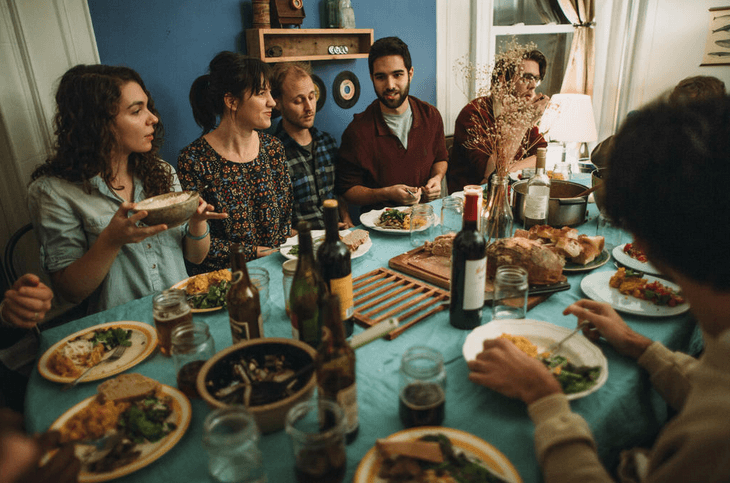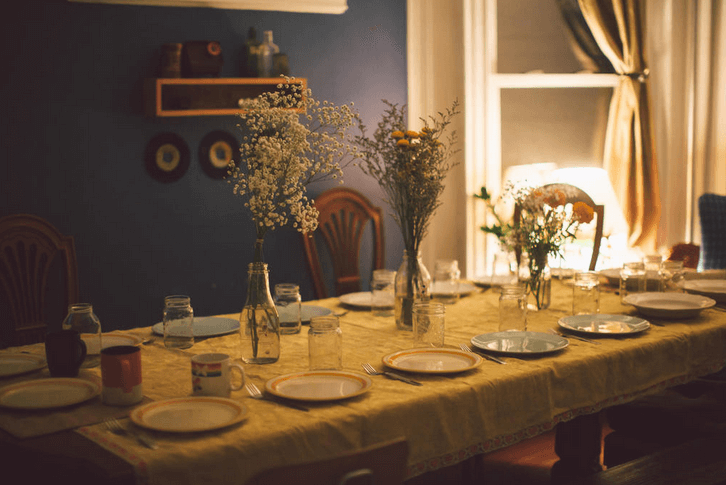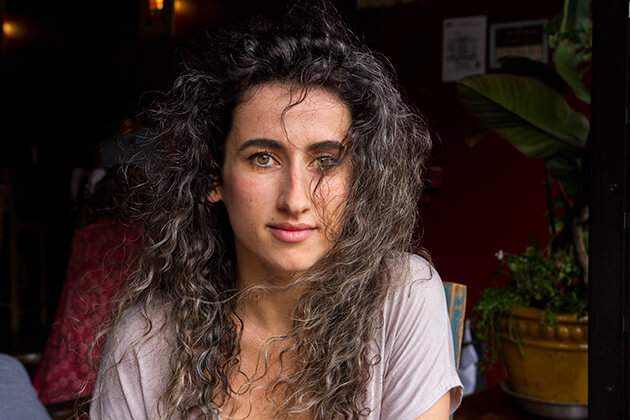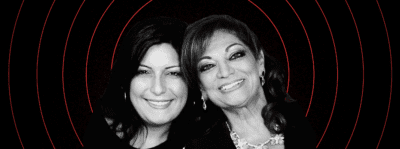Nomadique: An Art Collective Hosts One of the Best Dinner Parties in Brooklyn


photo by Sasha Arutyunova
There’s a quiet white and green house in Ditmas Park, with a string of lights that stretches from the second story to the first. The house has a patch of grass out front and three leafy trees in the small backyard. Like many of the Victorian homes in the neighborhood, the house is located on land formerly owned by the Ditmas family, and was likely built in the first decade of the 1900s.
Inside, Sasha Arutyunova is setting out silverware for twenty, and the table and assorted chairs take up most of the room. Jonathan Seale is cooking chili in the kitchen and Ben Stamper is prepping vegetables for the barbeque. For the next hour, a bevy of creative people pass through the house on their way to the backyard, where pieces of chicken and hot dogs are sizzling on the grill. Some of the people know each other and some don’t, but the mood is very inclusive and relaxed. Almost everyone has a beer in hand, and I catch conversations about post-graduate work, study abroad programs, and living in Denmark.
The quiet house is the home base of Nomadique, a multimedia cooperative co-founded by Arutyunova and Seale, as well as Jimmy Chalk and Andrew Ellis, shortly before they all graduated from New York University. For the past (almost) three years, they’ve hosted a monthly artist workshop dinner and a total of five pop up art exhibitions—in addition to directing and producing a handful of award-winning documentaries.
When Arutyunova calls everyone to dinner, we politely file inside. Three people are presenting today (the usual number), and more than twenty have shown up. “It’s really hard to keep it to the cap because you want everybody to come,” says Arutyunova, “but usually the bigger it is, the longer the dinners become and the less focused the discussion,” she adds. Tonight, the table is packed, and Ellis brings in extra chairs. People also squeeze onto a small white couch next to the table or sit on the floor.
Seale and Ellis have been living in the house for the past five years, and Arutyunova tells me that she lives nearby (and Chalk is away at law school in Massachusetts). The house has a little porch, floorboards that creak, and narrow hallways, but the kitchen is spacious and the rooms are all very tidy.
“Everyone living in the house is involved in our community,” says Ellis. “While some are transient subletters, everybody helps out at the art shows and attends the artist dinners.” The community—filmmakers, photographers, musicians, artists, and writers—is made up of the co-founders plus core members Katrina Sorrentino and Souki Mehdaoui and the larger network of contributors. “Everybody does their own work,” says Arutyunova, “and then Nomadique is the place where we end up developing our passion projects.”
Previous projects that have hewed their rough edges at Nomadique artist dinners have gone on to be featured in the New York Times, National Geographic, This American Life, and Le Monde in Paris, among others. The workshops were designed “around our own personal needs as artists,” explains Ellis. “It’s been a platform for me to workshop a cut of every film I’ve made in the last two years.”
Ellis previously taught cinematography at NYU, and has created a few documentaries with help from the Nomadique team, including Father Figure, which “grapples with the emotional challenges of reentry from prison,” and Eleanor Ambos Interiors, which follows a quirky, brilliant octogenarian who has built an empire of beautifully restored buildings. Next month, Ellis is heading off to Austin to complete a short MBA program—to develop “some financial skills that can help our educational and community endeavors to be financially sustainable,” he adds.
At the moment, everything is paid for “out of our own pockets,” says Arutyunova. She also works as a freelance travel and portrait photographer and, since 2010, has worked for the audiovisual collective Mason Jar Music (co-owned by Seale), which was named the world’s 6th most innovative music company by Fast Company Magazine in 2012. “For the art shows, we ask for a donation at the door and we hope that covers the costs,” says Arutyunova. “Sometimes it doesn’t.”
During the dinner, which is organized in large part by Katrina Sorrentino, a donation jar also stands on a small table, off to the side and almost out of sight. Some of the guests arrive with wine bottles in hand or even an eggplant and some zucchini. Seale accepts all the food donations while wearing a pinstriped chef’s apron and cracking jokes. Once the dinner starts, he finds himself inadvertently at the head of the table—no one had wanted to sit in the typical position of power—and semi-formally welcomes everyone. Arutyunova makes sure that each person has a full plate, and there’s enough barbeque, chili, wine, and beer for all.
“There’s a question that we ask everyone at the beginning just to get everybody talking about something,” Arutyunova later tells me when we meet at Outpost cafe in Adelphi, “which can be anything from ‘What was the best thing that happened to you today?’ to ‘What are you struggling with in your process right now?'” The answers that night matched up a man who has always wanted to learn to salsa with a woman who knows how.


photo by Sasha Arutyunova
By the time we had gone around the room, everyone had had their fill of the dinner, and it was time to present. “The goal is for it to be supportive, for the feedback to be constructive and helpful, but not discouraging,” Arutyunova tells me, “because the most important thing for us is for people to feel safe and comfortable showing works in progress, which is a really vulnerable thing to do, especially if you’ve just come into the community and you’re showing it to twenty strangers.”
“The exciting thing for me is that I get critical feedback from filmmakers and visceral feedback from nonfilmmakers,” says Ellis. He adds that, “while [Seale] has presented his music for some technical feedback, he takes the most joy in getting imaginative illustrations of the music he presents. He often asks, ‘What images came to mind? What feelings are you feeling when you hear this?’ He loves that stuff,” says Ellis.
And, indeed the feedback that evening for all three presenters gave each one a chance to hear varying opinions—from the simple ‘I really like it’ to well-grounded analyses of the work (each presenter had about an hour of time). Minor arguments erupted, but it was all in good form, and it reminded me both of the food-fight scene in Hook and of my small college classes. Some people were raising their hands to speak, and one person seemed ready to throw his chicken.
“I think sometimes hearing that people don’t like something has been the most valuable because either that encourages me to change it or it encourages me to stick to my own convictions,” says Arutyunova. “It kind of gives you more ownership to your own work because it’s not like you’re creating it in a vacuum and putting it on the Internet, and god knows who sees it. It makes you feel like there’s something more active happening.”
Through Nomadique, she’s recently workshopped a series of portraits about her half-sister in Moscow. “You can’t try to control the critique, and you can’t talk too much or start defending yourself a lot,” Arutyunova says. “The best thing to do is just to show the work and see where it takes peoples’ minds.”
Violet, 25, who works in photojournalism for a major media company, tells me that it’s her third time coming to a Nomadique dinner, even though she’s never presented and likely won’t in the near future. “I enjoy looking at people’s work,” she says. “I just don’t get the chance to make work myself right now.”
For Seale, Ellis, Chalk, and Arutyunova, it became apparent after college that they needed “a more structured community setting to experience art, support our friends, and hold each other accountable to finishing projects,” explains Arutyunova, “because when you’re no longer in the college environment where you’re getting a grade to finish a thing, what’s motivating you to do it?”
Almost three years later, they have a monthly workshop dinner and a pop up art exhibition series on their hands, plus a few documentaries under their belts. “Our challenge has been unifying so many talented and busy folks behind one central cause, for no money,” says Ellis. “None of us are in this for the money, but we’ve learned that survival instincts will always beat out the loftier concepts of community and self-expression.”
“We’re trying to crack the code on that,” he adds.
You might also like 






















